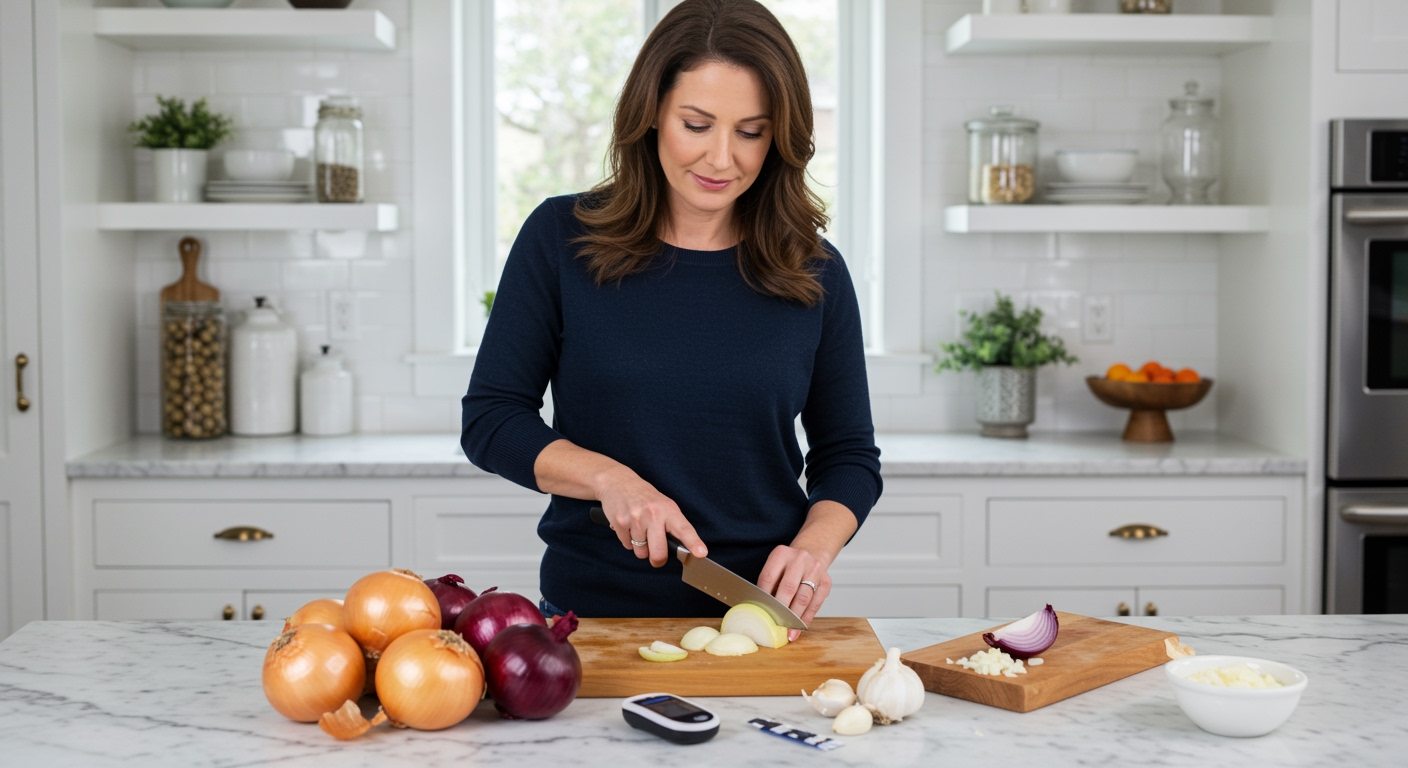✪ Key Takeaway: Onions are excellent for diabetes as they contain compounds that naturally lower blood sugar and improve insulin sensitivity.
Introduction
Your doctor just told you that you have diabetes, and suddenly every food feels like a potential enemy.
You might be wondering if that humble onion sitting in your kitchen pantry is friend or foe when it comes to managing your blood sugar levels.
Hi, I’m Abdur, your nutrition coach, and today I’m going to explain exactly how onions can become one of your most powerful allies in diabetes management.
What Makes Onions Special For Blood Sugar Control?
Onions contain a unique compound called allyl propyl disulfide that works like a natural blood sugar regulator in your body.
This sulfur compound actually mimics insulin by helping glucose move from your bloodstream into your cells where it belongs.
Research shows that people who eat onions regularly have lower fasting blood glucose levels compared to those who avoid them.
The quercetin in onions also plays a crucial role by reducing inflammation in your pancreas and protecting the beta cells that produce insulin.
When your pancreas stays healthy, it can continue producing adequate insulin to manage your blood sugar effectively.
✪ Fact: Red onions contain 25% more quercetin than yellow onions, making them slightly more beneficial for diabetes management.
How Much Onion Should You Eat Daily?
Studies suggest that eating 100 grams of raw onion daily can significantly reduce blood sugar levels within just four weeks.
That equals about one medium-sized onion or roughly half a cup of chopped onions per day.
You do not need to eat this entire amount raw, though raw onions provide the maximum benefit for blood sugar control.
Cooking onions reduces some of their active compounds, but lightly sautéed onions still retain most of their diabetes-fighting properties.
The key is consistency rather than perfection, so aim to include onions in your meals every single day rather than eating large amounts occasionally.
Start with smaller amounts if you are not used to eating onions regularly, then gradually increase to avoid digestive discomfort.
✪ Pro Tip: Add thin onion slices to your salads or sandwiches to easily reach your daily target without cooking.
Can Onions Replace Your Diabetes Medication?
Onions are a powerful supplement to your diabetes treatment plan, but they should never replace prescribed medications without medical supervision.
Think of onions as a natural enhancement that works alongside your medication to provide better blood sugar control.
Some people experience such significant improvements that their doctors can reduce medication dosages over time with proper monitoring.
The chromium content in onions helps your body use insulin more effectively, which can lead to improved glucose tolerance.
Regular onion consumption may also help prevent the long-term complications of diabetes by protecting your blood vessels and nerves from glucose damage.
Always work with your healthcare provider to monitor your blood sugar levels when adding onions to your daily routine, especially if you take insulin or other glucose-lowering medications.
✪ Note: Monitor your blood sugar more frequently when first adding onions to track their individual effect on your levels.
What About Onion Side Effects For Diabetics?
Most people with diabetes can eat onions safely without experiencing any negative side effects on their blood sugar management.
The main concerns are digestive issues like gas, bloating, or heartburn, especially when eating large amounts of raw onions.
Some individuals may experience blood sugar drops that are too rapid when combining onions with diabetes medications, which is why monitoring is essential.
If you take blood-thinning medications, discuss onion consumption with your doctor since onions have mild anticoagulant properties.
People with gastroesophageal reflux disease might need to limit raw onions, but cooked onions are usually well-tolerated.
Start with small amounts and pay attention to how your body responds, then adjust your intake based on your individual tolerance and blood sugar patterns.
✪ Pro Tip: Soaking sliced raw onions in cold water for 10 minutes reduces their pungency and makes them easier to digest.
The Bottom Line
Onions are not just safe for diabetes management, they are actively beneficial for controlling blood sugar levels naturally.
The best medicine often grows in your garden, not just in a pharmacy, and onions prove this truth every single day.
I would love to hear about your experience with onions and blood sugar control, so please share your questions or feedback in the comment section below.
References
At NutritionCrown, we use quality and credible sources to ensure our content is accurate and trustworthy. Below are the sources referenced in creating this article:
- PMC: Antidiabetic Properties of Onion
- SugarFit: Is Onion Good for Diabetes
- PMC: Onion and Blood Sugar Control
- Indian Express: Study Onion Lowers Blood Sugar





